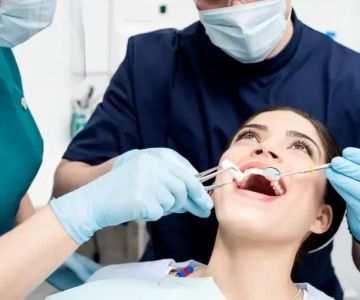What is a Tooth Abscess?
A tooth abscess is a pocket of pus that forms due to an infection and can occur in different areas of the tooth. It can be a periapical abscess, which occurs at the tip of the tooth. Recognizing the signs and symptoms of a tooth abscess is crucial for timely treatment.
Signs and Symptoms of Tooth Abscess
Common signs include severe pain, swelling, difficulty swallowing or breathing, and fever. If you experience any of these, it's essential to seek urgent dental care.
Treatment Options for Tooth Abscess
See a dentist promptly. A root canal treatment might be necessary if the tooth is salvageable. Otherwise, the tooth may need to be removed. Home remedies can offer temporary relief until you see a professional.
At-Home Remedies for Tooth Abscess
Over-the-counter pain meds, such as acetaminophen or ibuprofen, can help. Natural remedies like peppermint, chamomile, and clove oil have calming and antibacterial properties that may reduce pain. Applying a cold compress or using a wet tea bag on the affected area can also provide some relief.
When to Seek Urgent Care
If you have severe symptoms like uncontrollable bleeding, extreme pain, or broken facial bones, go to an urgent care center or emergency room immediately. For most cases, your dentist's office is the first place to go for treatment.
Dental Emergencies and Their Management
Different dental emergencies, such as severe toothache, cracked tooth, knocked-out tooth, extruded tooth, dental abscess, lost or broken dental restoration, and severe soft tissue injury, require specific actions until you can see a dentist. For example, for a knocked-out tooth, retrieve it carefully, rinse the root, and try to reinsert it if possible. Store it in milk or a special medium if reinsertion isn't feasible.
Urgent Care Centers and Their Role in Toothache Relief
Urgent care centers can provide immediate relief for toothaches. They assess the pain, recommend appropriate pain relievers, prescribe stronger medications if needed, administer local anesthesia for dental procedures, offer holistic pain management advice, guide on preventing pain worsening, and emphasize the importance of long-term solutions and follow-up appointments with dentists.
Handling Toothaches Caused by Infections, Abscesses, Cavities, and Other Issues
For toothaches caused by infections, urgent care professionals diagnose the infection, prescribe antibiotics, ensure the full course is completed, address immediate pain, and prevent complications. When dealing with dental abscesses, they identify and drain the abscess, provide pain management, prevent potential complications, and might prescribe antibiotics. For cavities, they identify and prepare the tooth for filling, use suitable filling materials, aim for immediate relief, and discuss post-filling care. In cases of tooth extraction, they evaluate the tooth's condition, administer anesthesia, perform the extraction safely, provide post-extraction care, and discuss replacement options. For dental damage, they assess the extent of damage and provide temporary crowns or repairs, emphasizing the need for follow-up with a regular dentist. In root canal cases, they diagnose the problem, administer anesthesia, perform the procedure, clean and seal the tooth, and discuss restoration options. For dental trauma, they assess the trauma, manage pain, attempt tooth reattachment if possible, stabilize loose or fractured teeth, and schedule follow-up appointments. Wisdom tooth pain is evaluated, local anesthesia or pain relievers are provided if needed, extraction is performed if necessary, and post-operative care and follow-up are emphasized.
Teledentistry for Toothache Relief
In the digital age, urgent care offers virtual consultations. Dental professionals can evaluate the toothache, provide pain management advice, prescribe medications electronically, suggest relief strategies like cold compresses or oral rinses, determine if an in-person visit is needed, and assist with scheduling appointments if necessary.
In conclusion, when dealing with a tooth abscess or any dental emergency, it's crucial to act promptly. Urgent care plays a vital role in providing immediate relief and guiding you towards appropriate long-term solutions. Don't suffer in silence; seek help and get back to a pain-free dental health.




 Westgate Dental Arts
Westgate Dental Arts Coventry Family Dental
Coventry Family Dental Familia Dental
Familia Dental Dr. Daniel S. Fife, DDS
Dr. Daniel S. Fife, DDS Dentistry At Suburban Square: Michael I. Wollock, DMD
Dentistry At Suburban Square: Michael I. Wollock, DMD Comfort Care Dental
Comfort Care Dental The Importance of Oral Health Education During Pregnancy for a Healthy Pregnancy
The Importance of Oral Health Education During Pregnancy for a Healthy Pregnancy Why Skipping Dental Checkups Can Lead to Bigger Oral Health Problems
Why Skipping Dental Checkups Can Lead to Bigger Oral Health Problems Advantages of Porcelain Dental Restorations
Advantages of Porcelain Dental Restorations Best Tips for Brushing Your Teeth Properly for Healthy Gums: Essential Techniques for Oral Health
Best Tips for Brushing Your Teeth Properly for Healthy Gums: Essential Techniques for Oral Health How Can Diabetes Cause Tooth and Gum Problems? Preventing and Managing Oral Health Issues
How Can Diabetes Cause Tooth and Gum Problems? Preventing and Managing Oral Health Issues Healthy Habits for Promoting Good Oral Health and Hygiene: Tips for a Healthy Smile
Healthy Habits for Promoting Good Oral Health and Hygiene: Tips for a Healthy Smile